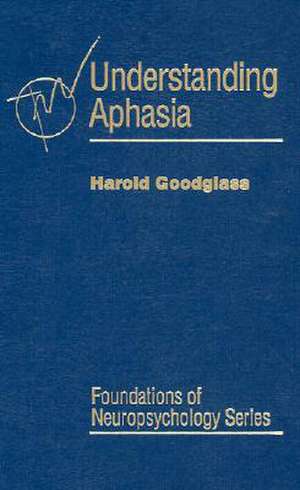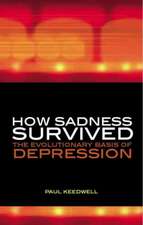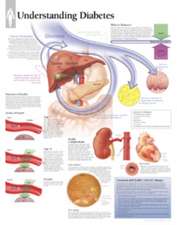Understanding Aphasia: Foundations of Neuropsychology
Autor Harold Goodglass Laird S. Cermarken Limba Engleză Hardback – 16 noi 1993
- Integrates phenomenology of aphasic symptoms with the anatomy of language and current theories of brain-language relations
- Traces history of aphasic theory, from pre-Broca to contemporary theory
- Provides detailed review of manifestations of aphasia in every language modality
- Contains critical analysis of neurolinguistic inter-relations
Preț: 486.20 lei
Preț vechi: 631.43 lei
-23% Nou
Puncte Express: 729
Preț estimativ în valută:
93.05€ • 96.78$ • 76.81£
93.05€ • 96.78$ • 76.81£
Carte tipărită la comandă
Livrare economică 14-28 aprilie
Preluare comenzi: 021 569.72.76
Specificații
ISBN-13: 9780122900402
ISBN-10: 0122900405
Pagini: 297
Dimensiuni: 152 x 229 x 25 mm
Greutate: 0.68 kg
Editura: ELSEVIER SCIENCE
Seria Foundations of Neuropsychology
ISBN-10: 0122900405
Pagini: 297
Dimensiuni: 152 x 229 x 25 mm
Greutate: 0.68 kg
Editura: ELSEVIER SCIENCE
Seria Foundations of Neuropsychology
Public țintă
Students and professionals in speech pathology, neurolinguistics, and neurology, as well as interested laypeople.Cuprins
Nature and Scope of the Problem of Aphasia: A Survey.
Historical Overview.
Anatomy of Language.
Disorders of Motor Speech Implementation.
Disorders of Word Retrieval.
Disorders of Syntax and Morphology.
Disorders of Auditory Comprehension.
Disorders of Repetition.
Disorders of Reading.
Disorders of Writing.
Apraxia and Aphasia.
Classification of Aphasia.
Relation of Aphasia to Normal Language: Fact and Conjecture.
References.
Author Index.
Subject Index.
Historical Overview.
Anatomy of Language.
Disorders of Motor Speech Implementation.
Disorders of Word Retrieval.
Disorders of Syntax and Morphology.
Disorders of Auditory Comprehension.
Disorders of Repetition.
Disorders of Reading.
Disorders of Writing.
Apraxia and Aphasia.
Classification of Aphasia.
Relation of Aphasia to Normal Language: Fact and Conjecture.
References.
Author Index.
Subject Index.
Recenzii
"Understanding Aphasia is the long-awaited work of a man who has arguably done more than any living person to describe systematically the many varieties of aphasia and to bring some order and coherence to their study.... This book is an appropriate testament to Goodglasss career, as it succeeds in setting out an orderly description of aphasia and its long history while making clear how difficult and confusing its study can be. It contains many well-chosen examples of the speech, writing, and other performances of individual patients the author has seen, providing an informative introduction to aphasic phenomena for those new to the topic.... This volume thus serves not merely as a summary of this fascinating and contentious field from a man who helped to shape and define it. It constitutes a scholarly yet practical description of aphasic phenomena and the history of their study at the same time as it breaks new ground in attempting to fit the diverse pieces of the puzzle intoa coherent theoretical framework. Understanding Aphasia provides an accessible introduction to the topic for the interested scientist while raising many substantive issues for debate among aphasia researchers.
The text is a must for anyone planning a career in clinical neuropsychology or speech pathology. However, these are only two of the potential target audiences for the book. Potential readership for this text is actually quite diverse. On the one hand, it is written with an elegantly simple prose and presentation of most clinical and conceptual issues at a level comprehensible by any graduate study in psychology (and some advanced undergraduates.) On the other hand, readers with substantial familiarity with one aspect of aphasia (e.g. behavioral neurology, linguistics) will nevertheless find other aspects of the text interesting, informative, intellectually challenging, and occasionally controversial." --CONTEMPORARY PSYCHOLOGY
"Goodglass has succeeded in his aim that the book should be accessible to interested readers who are not in the professions that are most concerned with brain-language relationships." --John Marshall in LANGUAGE AND SPEECH
The text is a must for anyone planning a career in clinical neuropsychology or speech pathology. However, these are only two of the potential target audiences for the book. Potential readership for this text is actually quite diverse. On the one hand, it is written with an elegantly simple prose and presentation of most clinical and conceptual issues at a level comprehensible by any graduate study in psychology (and some advanced undergraduates.) On the other hand, readers with substantial familiarity with one aspect of aphasia (e.g. behavioral neurology, linguistics) will nevertheless find other aspects of the text interesting, informative, intellectually challenging, and occasionally controversial." --CONTEMPORARY PSYCHOLOGY
"Goodglass has succeeded in his aim that the book should be accessible to interested readers who are not in the professions that are most concerned with brain-language relationships." --John Marshall in LANGUAGE AND SPEECH


















